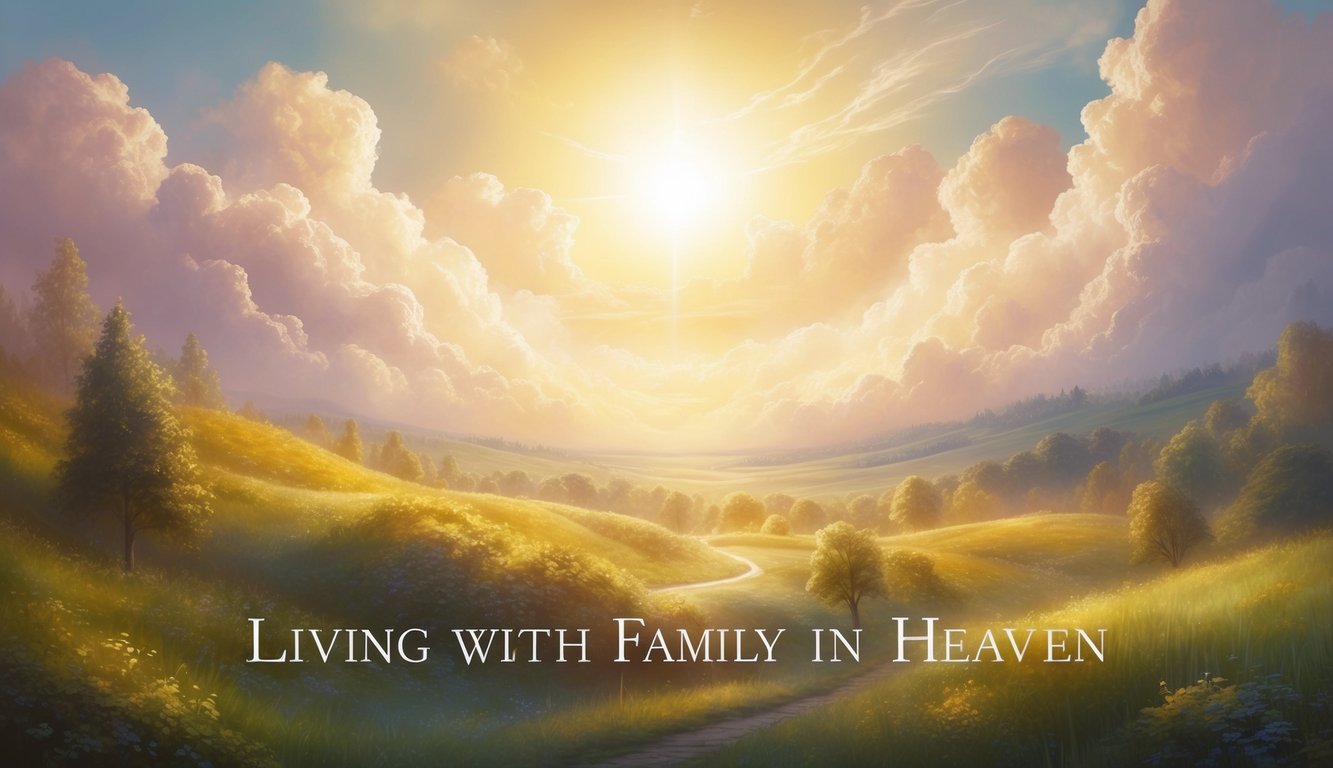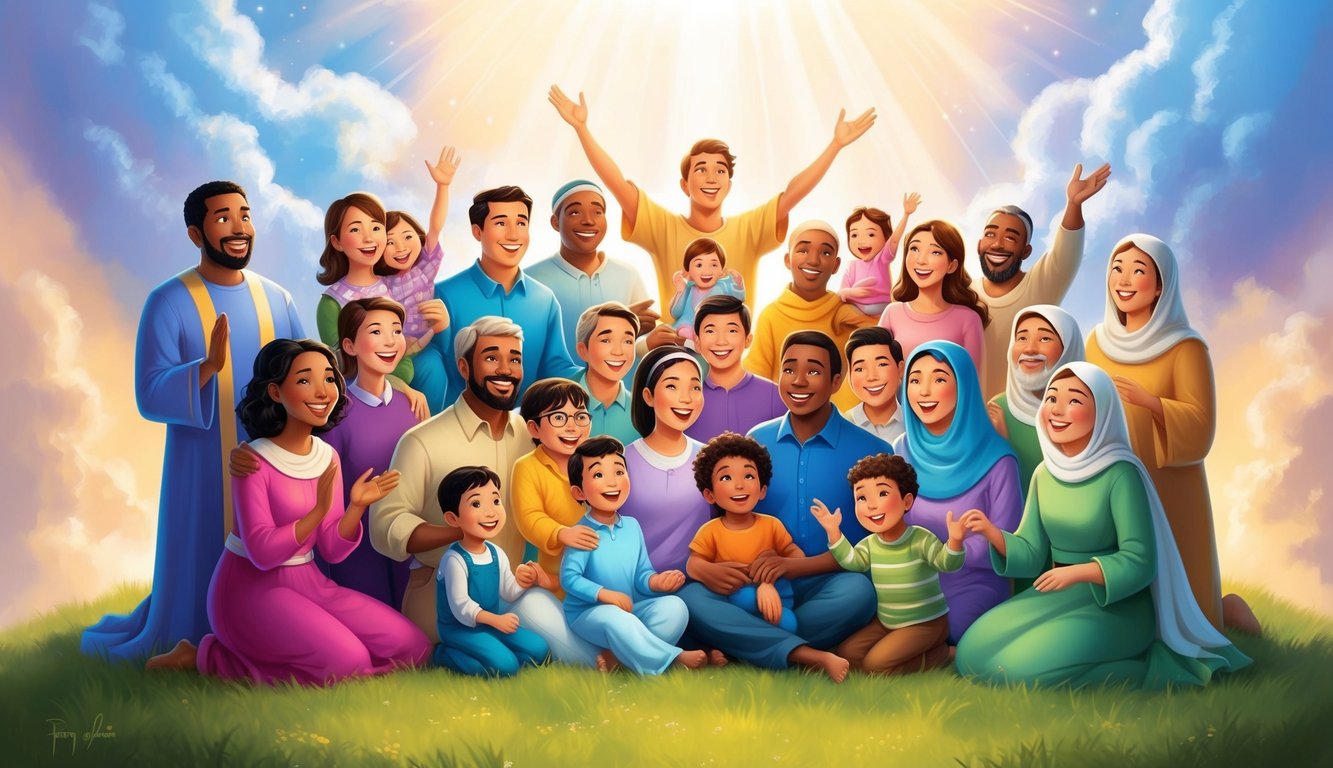Don’t Miss Out On This Unique Astrological Opportunity
Are you tired of spinning your wheels and getting nowhere? Simply put, you’re out of sync: you’re out of alignment with your astral configuration.
But: there’s a kind of map that can help you reclaim your alignment. Think of it as your own personal blueprint to success and happiness: a blueprint that will help you live your most amazing life.
Get started here.
People often wonder if they will be reunited with their families in heaven.
This question touches on deeply personal hopes about the afterlife and connections with loved ones.
Many religious beliefs, including Christianity, promise that families and friends will reunite in heaven.
This idea can provide peace to those seeking assurance about the afterlife with loved ones.
The belief in heavenly reunions is supported by interpretations of religious texts and teachings.
Various books about heaven explore the concept of eternal life with family, suggesting a continuation of bonds beyond this world.
These perspectives can enrich your faith and offer hope for a future where relationships endure.
As you ponder these ideas, remember they are shaped by interpretations of the Bible and personal beliefs.
Emotions tied to these beliefs can be complex and varied, reflecting the diversity of individual understanding.
Through examining different theological perspectives, you can gain deeper insights into how eternal life might unfold.
Key Takeaways
- Families may reunite in the afterlife according to many beliefs.
- Religious texts often support the idea of eternal bonds.
- Personal beliefs shape views on heavenly relationships.
Biblical Foundations of the Afterlife
Understanding the biblical perspective of the afterlife involves examining scriptures that mention heaven, the resurrection, and our spiritual family in eternity.
Key passages provide insight into the eternal life promised to believers and how these promises relate to living with loved ones in heaven.
Key Scriptures Addressing Heaven and Families
Several Bible verses discuss the concept of living with family in the afterlife. 2 Samuel 12:23 tells of King David, who believed he would join his deceased child in the afterlife.
This suggests a continued relationship beyond death.
In the New Testament, 1 John 3:2 hints that believers will see each other as they truly are in Christ.
Jesus also emphasized the eternal bond among God’s children.
The Old Testament through the New Testament focuses on communal worship and spiritual kinship, providing a foundation for the idea that families can be together in heaven.
Interpreting the Promises of Eternity
The Bible provides many promises regarding eternity.
The resurrection, as central to Christian belief, assures believers that death is not the end.
Jesus’ teachings in the Gospels, as well as Isaiah’s prophecies, offer reflections on eternal life with God.
The book of John often emphasizes the relationship between believers and Christ, extending this into eternity. 1 Corinthians 15:52 discusses the resurrection at the end times, a reunion for all believers.
Interpretations vary, but there is a consistent theme of eternal joy and union in God’s presence, suggesting a spiritual gathering of families in heaven.
Understanding Relationships in Heaven
In heaven, relationships are expected to transform while maintaining deep connections.
This includes family bonds, spiritual ties, and interactions with well-known biblical figures, all within the framework of eternal salvation and worship.
Continuity and Relationships Beyond Earth
Your relationships on Earth could continue in heaven, reshaped by glorified bodies and eternal purpose.
Family bonds might be enhanced by a perfect connection with God.
The idea is that your loved ones are part of an extended family in heaven, enriched by shared salvation experiences.
Friendships and interactions evolve into more profound bonds, no longer limited by earthly conditions.
This continuity offers a comforting view of an eternal community where family relationships hold different yet enduring significance.
Marriage, Family, and Fellowship in Eternity
Marriage as known on Earth might not exist in heaven.
According to biblical texts, marriage is an earthly institution and will change after life.
Jesus mentioned that in heaven, people will be like angels, neither marrying nor being given in marriage, suggesting a shift in how relationships like marriage are understood.
Yet, deep family ties and fellowship will still provide joy and connection.
You can expect to experience a different, more spiritual form of fellowship that is anchored in worship and love for God.
Encounters with Biblical Figures
Heaven promises encounters with figures like Moses, Elijah, Abraham, Peter, James, and John.
These interactions might not only offer a sense of historical continuity but also contribute to spiritual enrichment.
The Transfiguration event suggests that earthly relationships continue, with glorified appearances recognized by others.
You may also learn from their experiences and spirituality.
Such gatherings provide opportunities for growth and understanding in ways that aren’t possible on Earth.
Additionally, with figures like Paul and the Thessalonians, you might explore themes of salvation and eternal life in a deeply enriched heavenly community.
These themes emphasize the transformative power of faith and the hope of resurrection that strengthens believers in their spiritual journey.
In this context, Colossians 3 new life serves as a reminder to set one’s heart on things above, embracing a renewed identity in Christ.
This renewal fosters a commitment to righteous living and deepens the sense of unity within the heavenly community.
The Emotional Spectrum of the Hereafter

In the afterlife, emotions play a central role, offering a blend of joy and comfort to those who have lost loved ones.
This realm promises hope and the possibility of reuniting with family and friends, bringing a sense of healing and happiness.
Joy, Comfort, and Healing from Loss
In the hereafter, you may experience a profound sense of joy and comfort.
Being reunited with loved ones can heal the wounds of loss.
The idea of seeing dear friends and family again offers great encouragement.
Stories speak of influential figures like King David, who longed to be with his infant son, reflecting the human desire for family connections beyond earthly life.
Such reunions bring feelings of happiness and fulfillment.
The promise of perfection in relationships is highlighted, as past tensions give way to harmony.
It is believed that forgiveness allows relationships to flourish in a space filled with blessings.
These emotional bonds can create a sense of fellowship, where every soul is comforted by the presence of those they hold dear.
Hope and the Anticipation of Reunion
The anticipation of seeing loved ones again in the afterlife can fill you with hope.
Imagining a reunion with those who have passed can bring encouragement and happiness.
This joyous expectation provides reassurance and a sense of peace, knowing separation is temporary.
Historical and biblical figures, like King Saul and the rich man and Lazarus, illustrate the deep longing for reunion.
The teachings around Mary and divine figures emphasize the truth of eternal togetherness.
Recognizing friends and family in a perfect form adds to the richness of the emotional spectrum in the hereafter, affirming the belief that such reunions are part of the soul’s ultimate redemption.
Theological Perspectives on Eternal Life

Eternal life is a key concept in many theological discussions.
It involves understanding how believers are connected to life after death and whether relationships, like family ties, continue in heaven.
Salvation and Citizenship in Heaven
Your citizenship in heaven is often seen as granted through salvation.
Christians believe that accepting Jesus Christ as your Lord and Savior leads to eternal life.
This concept is tied to the idea of living with God forever, free from suffering and sin.
Paul’s epistles, especially Ephesians, speak about being citizens of God’s kingdom.
This implies that believers have a permanent home in heaven, where relationships can be transformed.
The notion of getting to heaven is often linked with forgiveness and the grace of God, highlighting the importance of faith and repentance.
Christian Views on Family Ties Beyond Earth
In Christianity, there’s a belief that family bonds may continue in heaven.
Jesus mentioned that relationships change after resurrection, as seen in Luke 20:34-36.
This suggests that while earthly relationships may not exist as they do now, healthy family relationships might find a new form.
Mary and Martha’s story with Jesus indicates the continuity of bonds beyond this life.
Christians see heaven as a place devoid of earthly struggles, where believers can reunite with loved ones.
The hope is that these family ties are enhanced through the love and presence of God, without the limitations of earthly life.
Biblical Figures on Living with God Post-Resurrection
The Bible gives insights into life after resurrection through stories of biblical figures. Jesus’s resurrection serves as the central example of eternal life with God.
The resurrection promises that believers too can rise and live with God eternally.
Figures like the apostles share visions of an afterlife with God, emphasizing a vibrant, renewed relationship.
This includes being brothers and sisters in Christ, where relationships are centered around worship and the presence of God.
The Bible implies that heaven is a place of reunion with God and others, presenting a vision of eternal peace and joy with Him.
Frequently Asked Questions

When thinking about life after death, many wonder if they will connect with their families again.
These questions look at how spiritual beliefs frame family ties in the afterlife and what religious texts say about these relationships.
Will we recognize our relatives and have relationships with them in heaven?
Many people hope to see familiar faces after death.
Some religious traditions suggest that you will know your loved ones, continuing the relationships that mattered most on Earth.
Does our spiritual existence in heaven include our earthly family ties?
The idea of keeping family relationships in heaven varies among beliefs.
Some spiritual views teach that these connections transcend earthly life and become part of a broader spiritual family.
Are there biblical references supporting the reunion of families in heaven?
Certain biblical passages hint at reunions in the afterlife.
For example, some point to scripture that discusses a gathering with loved ones in a heavenly home.
These references can offer comfort and hope.
How does one’s faith address the continuity of marital bonds in the hereafter?
Different religious beliefs have unique views on marital relationships after death.
Some believe marriage is an earthly institution, while others teach that bonds of love continue in a spiritual form beyond life.
What does religious scripture say about the nature of our interactions with loved ones in heaven?
Scriptures from various religions often talk about peace and unity in the afterlife.
These texts sometimes describe joyous meetings with loved ones, where earthly conflicts no longer exist.
In terms of spiritual belief, what is the anticipated age or state of individuals in heaven?
There are diverse views on the state of individuals in heaven.
Some traditions envision a spiritual form that reflects a perfect or ideal age.
This allows relationships to thrive without the physical challenges faced on Earth.



